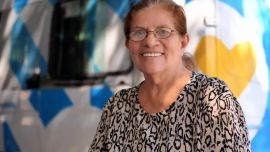The United States Office of Homeland Security has informally contacted the Argentine federal court to express interest in the results of the investigation into companies that bring Russian pregnant women across the world to give birth in Argentina, according to reports.
Police in Argentina began a series of raids Thursday in the wealthy neighbourhood of Puerto Madero as the courts investigate reports of an alleged million-dollar business that assists women and men arriving from Russia to settle in the country or obtain citizenship swiftly via birth of their children.
Argentina’s National Immigration Director Florencia Carignano, said in statements to the press that the arrival of the Russian women –– who made up more than half of the 10,500 visitors from Russia last year –– was being investigated to see if the arrivals were linked to “criminal” gangs. Immigration staff uncovered the situation after interviewing 350 Russian women arriving in Argentina with advanced pregnancies, said National Director of Immigration Florencia Carignano on Sunday.
The Office of Homeland Security probed the investigation led by judge Maria Servini for speculations of terrorism, espionage and drug-trafficking, Infobae reported Wednesday. Media outlets in Argentina reported over the weekend that Argentine authorities are probing links to such activities.
One of the speculations surrounding the case is that when the women have their children in the country, they can obtain residency, and subsequently an Argentine passport, for themselves and their partners. With such documentation, these Russian-natives gain entry without visa to more than 170 countries where the men –– who some authorities have interjected may not actually be the babies’ fathers –– can travel to a greater number of countries to traffic drugs or commit espionage.
So far, the only irregularity that judicial investigation has determined is that many of the individuals were not at the addresses they provided to immigration authorities.
Among the locations visited were a series of high-end hotels, including the Sheraton, the Regente Palace, NH Collection, Aires Express and the Esplendor. Sources said that of the 30 Russian citizens checked last Thursday, only eight were at their stated addresses.
The investigation, according to sources, began after a woman complained to the Federal Police about irregularities in the entry into the country of Russian citizens about to give birth, the birth of their children and the granting of migratory procedures.
After a series of enquiries, Judge Servini requested the raids, and now investigators are analysing the computers, tablets, mobile phones, personal documents, immigration documents, police certificates and money in foreign currency (including dollars and euros) as well as national currency (pesos) seized.
News of the raids came after immigration authorities detained six Russian women — three on Wednesday and three on Thursday — upon their arrival in the country on the grounds they may have falsely claimed to be tourists.
A few hours later, a further 83 Russian women also arrived in the country on flights arriving at Ezeiza International Airport, 16 of whom were pregnant.
The official said that the Russian boom in so-called “birth tourism” had first been noted last August and that the arrivals all had similar characteristics: they were women in the last trimester of pregnancy who had purchased tourist packages that include a temporary rental contract for a local property.
"We are delighted that they come to make their lives in Argentina, but the problem is that they arrive, [they] have their children, register them as Argentines, leave a power of attorney with their guardians, leave and never come back. There are people here who are using our passport,” said Carignano.
"If we don't start controlling who we give our passports to, we will lose the trust we have with other countries," Carigano also noted.
Kirill Makoveev, a Russian citizen resident in Argentina and the founder of RuArgentina, one of the companies offering birth tourism services, rejected claims of human-trafficking in an interview with a local television station.
Speaking to C5N channel, Makoveev said RuArgentina provinces “a quality service, translation, information and support – we do not traffic people.”
He continued: “These are false accusations and these words will have consequences. We are a team, we sell our time. We do not sell passports or ID cards. We sell information on how to get these documents legally.”
Makoveev said his clients were generally from the upper classes and that travel packages for birthing services in Argentina cost at least US$5,500.
"We provide the services that are lacking in the market. Nobody is going to talk to a pregnant Russian woman in Russian here in Argentina, neither in hospitals, nor at the National Migration Office, nor in the courts. So she has to learn to speak Spanish or use our services. Nobody is going to translate for her, or help find a doctor, or a hospital. So we do it ourselves and we charge them for it,” he said.
Responding to comments from Carignano, officials at the Russian Embassy in Buenos Aires denied the officials claims that “false tourism” was being practised, describing it as “a very inaccurate phrase.”
Georgy Polin, the head of the Russian Embassy’s consulate in Argentina, said that the two nations had a non-visa agreement that "enables citizens of the two countries to enter their respective countries with their passports and stay for 90 days for non-commercial purposes, without the intention of settling down.”
Acknowledging that Russian citizens were “arriving in large numbers, between 12 and 15 times more than in other years," Polin told Perfil that the agreement signed in 2009 during the presidency of Cristina Fernández de Kirchner allowed for people to “spend that time visiting a family member, taking a short course of education, [and] doing unpaid work such as volunteering, so it does not cover exclusively tourist purposes."
–– TIMES & AGENCIES



















Comments